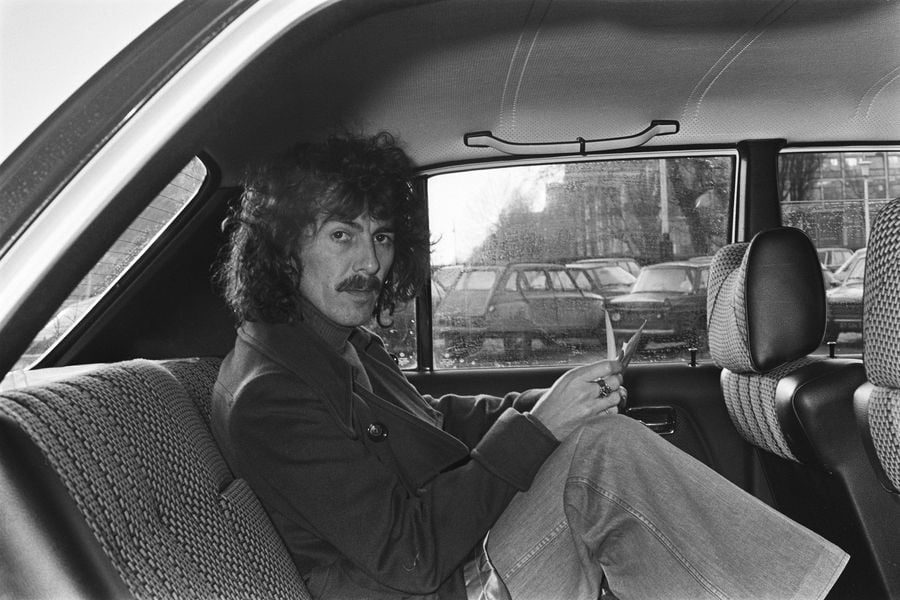In 1974, George Harrison made a curious comment about Paul McCartney. Not only did he make it clear that he didn’t want to reform The Beatles, but he also painted the bassist as bossy and dictatorial. It came at a time when Harrison was pouring aspects of his personal life into his work, showing the extremities of his religion and his excessive drinking. Indeed, Dark Horse, the record he was making at the time, was not a pleasant album, but it was a very, very good one.
Dark Horse offers an interesting bridge between the more pastoral Living In The Material World and the giddily inventive Extra Texture, retaining some of the former’s solemn atmosphere and lacking some of the lush detail that made up the latter, Dark Horse setting sparky guitar licks over a sprightly rhythm section Harrison intended for the live stage.
The protracted instrumental passages stand as a crossroads between the two better-celebrated albums, but Dark Horse was ultimately written as a live document, offering listeners a map for the upcoming American shows. He was growing more confident as a slide player, which was ideal for a man losing some of the nuances from his voice, and some of the tracks are given newer leases of life when the slide appears.
Hauntingly beautiful, ‘So Sad’ is also one of the few songs to feature a hummable chorus, clouding the sadness with a melodiousness that was pleasantly Dylanesque in its resolve. Unlike the more intricate numbers on the album, Harrison’s lugubrious voice felt apposite for a track about changing seasons and fading memories. “It is so sad,” Harrison recalled. “It was at the time I was splitting up with Pattie.”
The title ‘Dark Horse’, if little else, was an obvious dig at his standing in the eyes of the world. His critical notices were stronger than McCartney’s, his singles were outselling Lennon’s, but he still remained, as ever, a stranger in the world of pop. As he himself would say, “The one nobody’s bothered to put any money on [to win]. That’s me I guess.”
Behind the obvious metaphor stood an even steamier one: Growing up in Liverpool, Harrison understood a “dark horse” to be someone who could fulfil a person’s deep-rooted sexual desires. His list of conquests were many (Pattie Boyd herself suggested that something “happened” between Harrison and Maureen Starkey, Ringo’s wife) and much like Leonard Cohen, he felt there was a direct correlation between the sexual and the spiritual.
But Dark Horse has one glaring drawback: the vocal performances, ragged and damaged by a throat infection, sound tired, tested and tortured by the demands of the music. When the material warranted a more damning performance (“Simply Shady”), the harder-edged tones added to the drama, but on the softer tracks, Harrison sounded cragged, leading many listeners to query the reason to record the album under duress.
No sooner had he completed the album than a cruel joke circulated among the presses, that the album was more “Dark Hoarse” than Dark Horse. Never the greatest singer in the world, Harrison nonetheless could lend his voice to most genres, but his punctured, flat vocal deliveries on Dark Horse were a godsend to trendy journalists determined to knock The Beatles off their pedestal.
Not everyone shared this opinion so liberally, and there were likely murmurings that Harrison was using his doctrines to disguise his sexual fantasies. “[George]liked the things that men like,” chuckled McCartney in the Martin Scorsese documentary. “He was red-blooded.”
‘Dark Horse’ sets out to explain Harrison’s point of view. He had little interest in discussing any transgressions with any hot-headed journalist swooping for a headline. Everyone had their own secrets to hide, so why was he expected to oblige their requests? Even as late as 1974, he was being underestimated by both his peers and the presses, but if he was anxious to get an apology, then he should have waited for his voice to heal. The vocal on ‘Dark Horse’ sounds ragged, and it sounded even worse onstage as Harrison-chiefly a backing singer-tried to replicate the complicated performance onstage.
So, it made sense that he decided to take this opportunity to make his opinions known about Paul McCartney’s bass playing. “Paul is a fine bass player, but he’s a bit overpowering at times,” Harrison admitted, before stating that he could join a band with John Lennon, but McCartney was a no go. Maybe it stemmed from the anger of his work, or maybe it came from genuine disinterest in the band, but Harrison needed to unload and aimed it at the bass playing.



